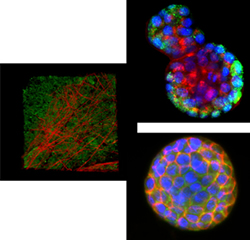Roberto Weigert, Ph.D., Chief
Mission
The aim of this unit is to investigate the molecular machinery regulating membrane trafficking in mammalian cells with a particular emphasis on salivary glands. The primary role of salivary glands is to secrete saliva, a watery protein-rich fluid, which plays a fundamental role in digestion, lubrication, host defense, and tissue repair. Impairment in their function is observed in the autoimmune disease Sjogren’s syndrome and as a side effect of radiation treatments for head and neck cancer. Understanding the molecular mechanisms regulating protein sorting and secretion in salivary glands will have a broad impact in understanding the physiology of these organs leading to better strategies to cure salivary dysfunctions.
Three major areas are being currently investigated in this unit: 1) biogenesis and exocytosis of secretory granules, 2) sorting of proteins at the level of the trans-Golgi network, 3) mechanism of endocytosis at the plasma membrane. Our studies integrate various approaches, which include intra-vital multi-photon microscopy on mice and rats and live cell imaging in 3-dimensional tissue cultures coupled to molecular biology and biochemistry.
Personnel
Myo Pale’ Aye
Monika Sramkova
Andrius Masedusnkas
Walt Amornphimoltham